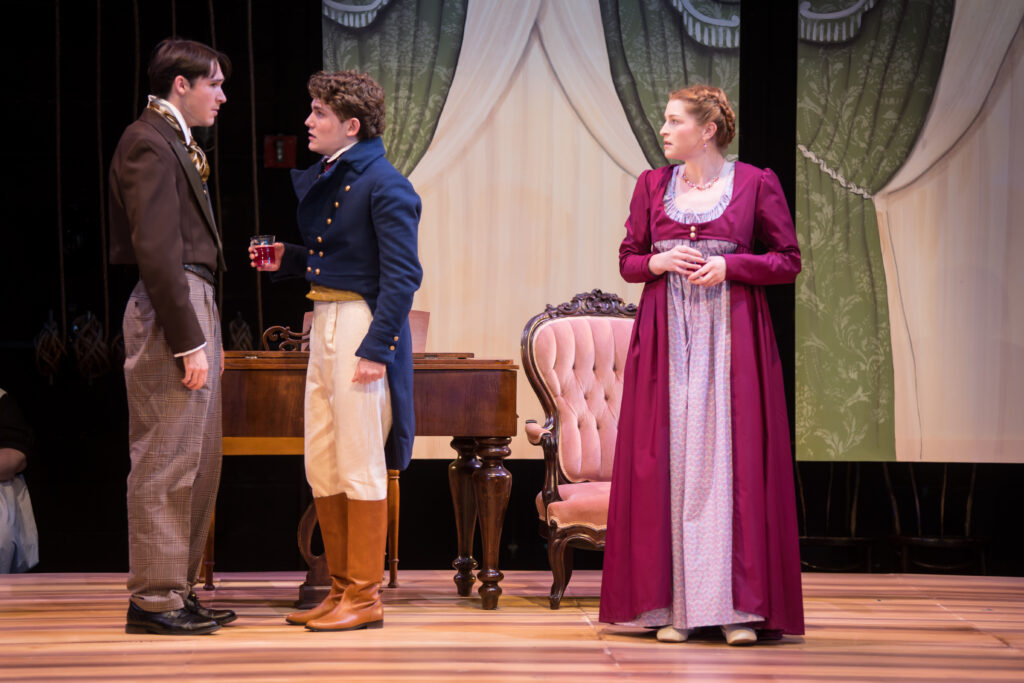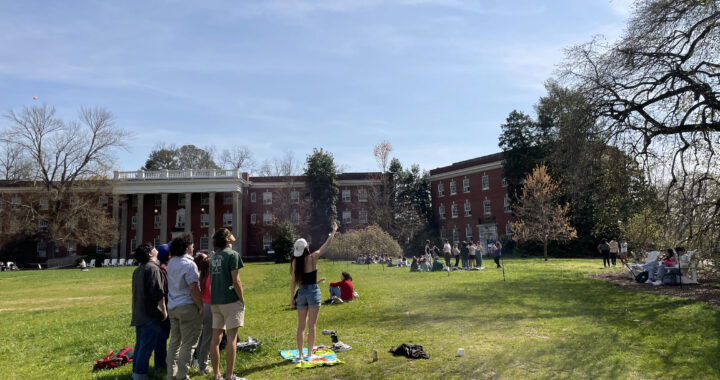Kate Hamill’s modern rendition of “Pride and Prejudice” comes to UMW’s Klein Theatre
4 min read
Elizabeth Bennet and Mr. Darcy doing a poor job of avoiding each other at a party. | Photo courtesy of Geoff Greene
by JOSEPHINE GOOD
Life Editor
UMW Theatre is back with its final Klein show of the semester, “Pride and Prejudice” by Kate Hamill. The show takes the classic Jane Austen story and puts it in a more modern light. This version of the classic tale is definitely not the same “Pride and Prejudice” that your grandma read to you, since there are characters smacking butts and making sexual innuendos throughout the show.
Consistent with the original story, the play follows the unlikely love story of Mr. Darcy and Elizabeth Bennet. The two battle back and forth for the entirety of the show, both with each other and with their feelings. Lizzy’s sisters are also incredibly involved in the story, finding their own love and misfortune as the show progresses.
A long-time fan of “Pride and Prejudice,” I was very excited to see this show. As I entered the theatre on Friday night, the anticipation kept building. Although I knew the Austen novel well, I hadn’t experienced this version of the tale.
One of the first things I noticed about the stage set-up was the deconstructed set pieces. I liked the abstract set design that showed parts of backstage to the entire audience. Seth Drenning, a junior theatre major who plays Mr. Darcy, described the set and how it affected the performance for the actors.
“There is no backstage to this set so even when we aren’t in a scene, we are sitting just ‘offstage’ still in view of the audience,” said Drenning. “It can be stressful knowing that I always might have eyes on me, but it has mostly been a lot of fun working with such a unique set. I feel like I’m watching the show with the audience and sharing this experience with them.”
A staging element that I didn’t notice was that the actors were performing on a raked stage, which means that there is a slight tilt put on the stage to lift the background and bring down the foreground. This makes it so that everyone in the audience is able to see everything that happens on stage.
“We moved the show from the rehearsal hall into Klein Theatre a few days early just to help us get used to the raked stage, which was also a first for me,” said Drenning. “When the stage is on an incline you don’t realize how tiring and jarring it is until you step off of it.”
The word that Drenning used to describe the abstract performance was “meta-theatrical.” This form of theatre is used to portray the trivial aspects of the characters’ lives and how their lives all feel performative.
This type of performance is pleasing to watch because it exaggerates all of the clever or emotional nuances of the show, and boy, were there some of those. The youngest Bennet daughter, Lydia, played by Megan Dineen, was full of sassy and raunchy comments, including, “Perhaps she will die—that would be romantic!”
This show double-casted the players, so everyone except for Emma Magner, a junior theatre major who plays Elizabeth Bennet, and Drenning as Mr. Darcy played two roles. This double-casting of characters made the show a million times more hilarious and added a silly undertone to the whole piece, helping break up the tension throughout the show. For example, when Mary and Mr. Bingley—both played by Mason Clark—were in the same scene, Jane was left dancing around with only a coat while Clark was in a dress playing the brooding middle Bennet sister.
When discussing the difficulties of putting together the show, Magner described the challenges of accent work.
“It was my first time doing accent work for a show, so it was a bit difficult at first since I didn’t know how to go about it,” she said. “Guidance from our director and starting accent work early in the process helped tremendously and the more times I used the accent in rehearsal the more comfortable I became in it.”
Personally, I loved the accents. I wasn’t sure if they were going to play it as a period piece or as a modern interpretation, and I was happy to see that they did a mix of both.
Something that remains the same in the Jane Austen book and this telling of the story is the undeniable connection between Mr. Darcy and Lizzy. I’m often a pessimist when it comes to love stories and don’t usually care for them. However, despite the fact that this is just a play, the way that Mr. Darcy looked at Lizzy gave me chills more than any other experience I’ve had in a theatre. There was unmatched chemistry between the characters that led to a believable attraction emanating from the duo.
This production of “Pride and Prejudice” is easily digestible for people who aren’t familiar with the novel, and for those who know the story well, it is a humorous retelling of a doomed-yet-passionate love story.
The play will be showing April 12–15 at 7:30 p.m. and April 16 at 2 p.m. in Klein Theatre. Tickets are $5 for UMW students and $25 for standard admission.











